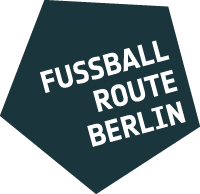1:75Alte Försterei
An der Wuhlheide 263
During a match against Hertha BSC fans for the first time shouted “Eisern Union!”.
Since August 7, 1920, the Union club had made its home in the stadium at the Wuhlheide. In the 1922/23 season, the footballers from Köpenick made it to the final round in the German championship. After defeating the team Arminia Bielefeld and the Spielvereinigung Fürth team in the quarter- and semi-finals, Union played against the Hamburger SV (Hamburg sports club) in the final match. The match drew 64,000 spectators to the Deutsche Stadion (German Stadium) in Grunewald, but the team could not prevail over the HSV’s players. The club’s earlier successes had awakened interest, ambitions, and desires in Berlin as well as throughout Germany. Several players then left the Union club and switched to clubs that were in a stronger financial position. Their leaving was the reason why after 1923 the Union Club could not maintain its earlier level of high-quality sports. Legend has it that during this decline, the team was cheered on for the first time by fans shouting “Eisern Union!” (iron Union) when the team was playing against its city rival Hertha BSC. That cheer is still chanted by enthusiastic fans even today. It took almost two decades before the Union club made football history again by winning the Berlin championship.
Additional topics on the information board
- The Union Club during the Nazi era
- Sportgemeinschaft (sports association) Oberschöneweide
- Split of the club during the Cold War
- The Union Club in the GDR’s Oberliga (premier league)
Winning the FDGB Cup was the biggest success in the history of the 1. FC Union.
In 1968, the 1. FC Union winning the FDGB Cup celebrated this as the greatest success in its history. After defeating the teams of Sachsenring Zwickau and the FC Vorwärts Berlin, the Union team triumphed over the FC Carl Zeiss Jena team, back then the GDR champion, in the final round with a score of 2:1. The victorious players, among them Günter “Jimmy” Hoge, Wolfgang Wruck, and Reinhard Lauck, became the Union Club’s living legends. However, the club was denied the opportunity to compete for the Cup Winners’ Cup because the invasion of Czechoslovakia (CSSR) by Warsaw Pact troops caused a significant and long-term disruption in international sports, and the GDR’s football association pulled the 1. FC Union out of the cup competition. In the years that followed, Union never advanced beyond mid-level achievement in the GDR Oberliga (premier league) and was repeatedly relegated to the nation’s second highest league.
Additional topics on the information board
- Founding of the 1. FC Union
- The FDGB Cup
- Union League and Union Cup
- Fans and GDR government entities
The 2000/2001 season turned into a success story for the 1. FC Union.
The 2000/2001 season turned into a success story for the club. With easy confidence the team placed first in the newly organized third division North and moved up into the German second league. After spectacular wins against the teams Rot-Weiß Oberhausen, Spielvereinigung Greuther Fürth, SSV Ulm 1846, VfL Bochum, and in the semi-final on penalty shoot-out against Borussia Mönchengladbach — all of them teams in a higher league – the Union team played in the final round for the DFB Cup (DFB, German Football Association). After a brave and spirited start, the team from Köpenick was defeated in the final round by the German runner-up Schalke 04 with a score of 0:2. The Union players gained much sympathy, and henceforth in the eyes of the whole nation the club had achieved iconic status. Since the FC Schalke team was qualified for the champion league (Champions League), the 1. FC Union as cup finalist played in the UEFA Cup (Union of European Football Associations) matches but was eliminated in the second round.
Additional topics on the information board
- Always on the brink
- Stadium construction and shares
- Women’s football
- Young talent for the Union Club
An diesem Standort wird die Informationstafel zu einem späteren Zeitpunkt aufgestellt.











